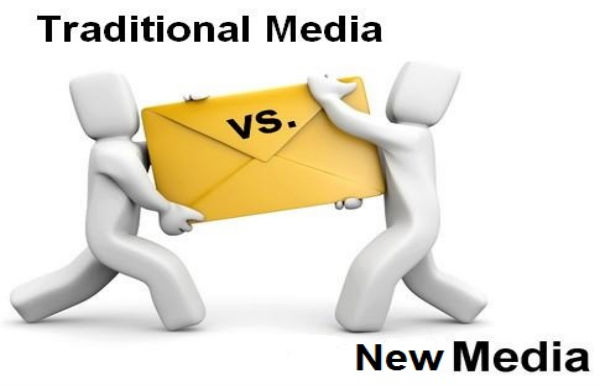
I’ve made public speeches on this topic in the past which gave opportunity to a sentiment that a few years later there’ll be nothing: no newspapers, no TV, no… in short, only the Internet. And that made me recall a scene from the film “Moscow Does Not Believe in Tears” shot 35 years ago [editor’s note: the original Russian-language film was released in 1979]: “In the future, there will be no theater, no movies, no newspapers, only television, widespread television…” When you watch this film today, doesn’t it make you just want to laugh? Who could’ve assumed 35 years ago that something called the Internet would appear and now there are “advanced” people who predict that “In the future, there will be no theater, no movies, no newspapers, only the Internet, widespread Internet…”
In truth, the subject of debate is no laughing matter. It’s hard to convince an entrant into the world of new-new media, an 18–20 year old who works only online and who’s only seen the Internet that, for example, you can find a book in the National Library [of Armenia] catalogue, order it, receive it, sit in the reading room and read it (this is how our generation learned). No, don’t misunderstand me, I’m not calling for the renouncing of computers and turning toward paper catalogues — though they carry a lot of information in them. On the contrary, my remarks are going to be about the use of computers in library catalogues. That is, not that the war in media should continue but gradually it should come to a reconciliation, with the aim of peaceful co-existence.
The cinema began to develop 100 years ago and the “forward-thinkers” began to break the sad news of the death of theater. But the theater has not yet died and in fact, peacefully co-exists with movie cinemas, though the competition between them continues.
Parallel to the development of radio, then television, the “forward-thinkers” taken with these media began to break the sad news of the death of newspapers. Thank god, papers haven’t yet died and peacefully co-exist with radio and television, though the competition between them continues.
Finally, the entry and development of the Internet certain other “forward-thinkers” perceived as the death of traditional media and they warn of this death every day.
Don’t wait for it — it won’t happen. And here’s why.
Media developments in previous centuries showed that the gadgets and the technologies that insert information on these gadgets might change, but the essence remains the same. After the discovery of paper, no one wrote on parchment or papyrus. It would be laughable if after Gutenberg’s invention someone distributed hand-written books or newspapers (though till today one can come across handwritten media stuck on electric poles, announcements such as “Selling…” or “For Rent…” — it’s an issue of resources)… This way it’s possible to list all the stages of technological progress. It’s simply that in the 21st century, the speed of this progress has changed.
And now, really, there’s a war among media. I avoid using the word “competition” in this case because this truly is a war and a brutal one at that. Traditional print media (newspapers and magazines), who in the last 80–100 years were forced to struggle against the constantly growing influence of radio and television and find ways to attract more readers, now are fighting on the third front — against online media. Radio and television, by offering more timely and fast information and more interesting time spent, seemed like they were squeezing print media (out of the market), but now they’re being cramped by the same constantly growing influence of the Internet. The Internet itself has begun to feel the push of the frantic development of technology and its inventors too have fallen in the fire at the hands of their proposed first, second, third, fourth or I don’t know which generation’s “I-don’t-know-what-Phones” and “I-don’t-know-what-Pads.” Consumers don’t even manage to adapt to how one gadget works when another appears in the market, which becomes outdated one year later. While in this crazy race, newspapers, nevertheless, still live on, the traditional paper version also appearing on new gadgets, and television and radio still live on, also conquering the online space.
And the Internet? It doesn’t resist the “intervention” of traditional media (in this case, I mean newspapers, magazines, radio and TV); on the contrary, it agrees to being “occupied” by traditional media’s “troops”… Unlike in military occupation, it doesn’t deprive anyone of sovereignty and doesn’t reduces its borders, but quite the opposite, it broadens its, the Internet’s, territories…
And when it becomes clear to all that such an occupation suits everyone, the media war will be replaced in the same space by peaceful co-existence — until a new media appears and just like in the song by (Armenian rock group) Ardzagank (“Response”), “Tomorrow everything will begin again…” In this case, the new war is between online media, which for many has already become traditional, and that which has newly appeared…
Thus, let the “forward-thinkers” not break the sad news of the death of this or that type of media before its time, especially since no one knows what new thing is going to surface in 10 or 20 years that will erase current perceptions of the “widespread Internet”…
Mesrop Harutyunyan
The views expressed in the column are those of the author's and do not necessarily reflect the views of Media.am.


Add new comment
Comments by Media.am readers become public after moderation. We urge our readers not to leave anonymous comments. It’s always nice to know with whom one is speaking.
We do not publish comments that contain profanities, non-normative lexicon, personal attacks or threats. We do not publish comments that spread hate.